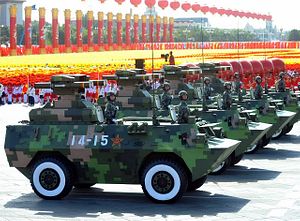The People’s Republic of China will increase its defense budget by 886.9 billion yuan ($141.45 billion), according to Reuters. This confirms speculations that the spending increase will outpace China’s sluggish GDP-growth of around seven percent projected for 2015.
As an expert on China’s military notes, “The defense budget is basically no longer tied to economic performance. There is a political decision made across the board in China that defense spending is sacrosanct, untouchable.”
China’s defense budget rose by 12.2 percent last year to about $132 billion, second only to the Pentagon’s war chest, which still boasts the world’s largest military budget at around $534 billion in baseline funding. However, as I pointed out yesterday, the Chinese defense budget does not take into account various expenditures such as weapons imports, research and development, and money spent on the PLA’s strategic forces. Real military expenditures may be as much as 40 – 55 percent higher.
What are the funding priorities of the Chinese military in 2015?
According to Premier Li Keqiang in his report to the National People’s Congress, the principal effort will be the modernization and informatization of the armed forces.
“We will comprehensively strengthen modern logistics, step up national defense research and development of new- and high-technology weapons and equipment, and develop defense-related science and technology industries. Governments at all levels must always take an active interest in and support the strengthening of our national defense and armed forces,” he said.
According to Reuters, Lieutenant General Zhong Zhiming, a delegate to the congress notes: “We must develop our weaponry and raise the standards of treatment for military personnel; only then will we be able to really strengthen our strategic combat effectiveness. Then no enemy will dare to bully us.”
A recent report by the RAND Corporation points out that the Chinese military is suffering from various shortcomings that could “limit [the PLA’s] ability to successfully conduct the information-centric, integrated joint operations Chinese military strategists see as required to fight and win future wars.”
“Compared with other large countries, the road of China’s defense modernization is more difficult (…) We need some time,” emphasized Fu Ying, a spokeswoman for the National People’s Congress, according to the Wall Street Journal.
In a commentary published today, China’s official press agency, Xinhua, accuses Western countries of double-standards when it comes to military spending. “The double-standard deeply rooted in some Western countries’ minds makes them biased when they look at China, which, according to their imagination, should better be a giant market and concurrently a military dwarf.”
The commentary further notes that concerns over China’s growing military budget are unfounded since it has lower per capita military spending than other countries such as the United States and Japan, and spends “less than 1.5 percent of its GDP,” which is “lower than the average level of 2.6 percent worldwide.”
More interestingly, the commentary emphasizes that China has no allies in the international system, forcing it to spend more money on defense:
“Unlike Britain and Japan that have alliance to share military technology, China’s defense modernization is naturally to be more difficult, as it has to rely mostly on itself to start from scratch, which surely demands a relatively high military expenditure [sic].”

































